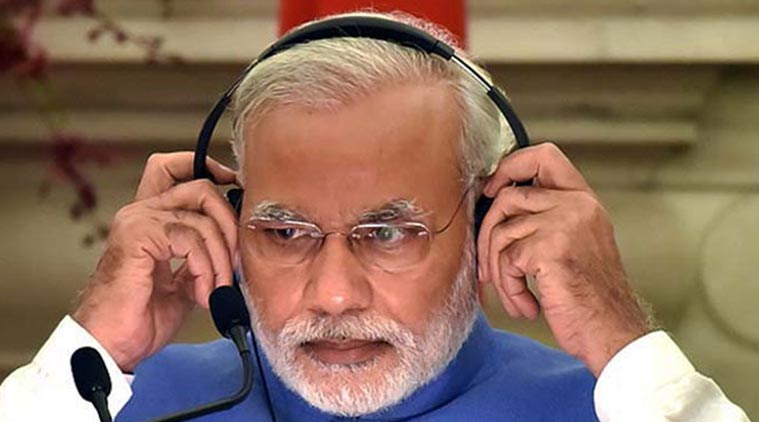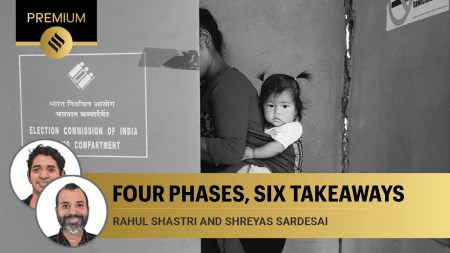- India
- International
Land bill: Modi govt gives in, agrees to bring back UPA’s key provisions
Sources said all the 11 BJP members in the Joint Committee of Parliament on land bill on Monday moved amendments seeking to bring back social impact assessment and consent clause.
 Prime Minister Narendra Modi.
Prime Minister Narendra Modi.
In a major climbdown following sustained opposition pressure, the government on Monday agreed to drop most of its contentious amendments to the Land Acquisition Act of 2013, bringing back the crucial clauses related to consent of affected families and social impact assessment (SIA).
The NDA government had brought in nine main amendments to the 2013 legislation through an ordinance, and subsequently as part of a Bill. According to sources, six of these amendments were discussed at the meeting of the Joint Committee of Parliament — and consensus was evolved.
VIDEO
“It’s as good as our own Act of 2013,” a Congress member of the committee said after the meeting expressing total agreement with the amendments moved by the ruling BJP.
[related-post]
Trinamool Congress members Derek ‘O Brien and Kalyan Banerjee walked out of the meeting stating that the amendments were circulated this morning and they had little time to study.
Six of the amendments were discussed today on which there was a consensus.

Out of the total 15 amendments in the NDA bill, nine were substantial in nature that have been opposed by Congress and a number of Opposition parties.
Out of these nine six including the provisions dealing with consent clause, social impact assessment, replacing the term private company with private entity were discussed today and a consensus has emerged on them, Congress members claimed.
The Right to Fair Compensation and Transparency in Land Acquisition, Rehabilitation and Resettlement (Second Amendment) Bill, 2015, seeks to amend various provisions of the 2013 land law. It also seeks to replace an ordinance brought by the government last December and promulgated thrice since then.
The NDA Bill enabled the government to exempt five categories of projects from the requirements of social impact assessment, restrictions on acquisition of multi-cropped land and consent for private projects and public private partnerships (PPPs) projects.
The five categories of projects it sought to exempt are defence, rural infrastructure, affordable housing, industrial corridors, and infrastructure including PPPs where government owns the land.
The UPA Act deemed the head of a government department guilty for an offence by the department. The Bill removed this, and added the requirement of prior sanction to prosecute a government employee.
The Act would apply retrospectively, if an award had been made five years earlier and compensation had not been paid or possession not taken. The bill exempts any period when a court has given a stay on the acquisition while computing the five year period.
The 2013 Act required consent of 70 per cent of landholders for PPP projects, and 80 per cent for private projects. The NDA bill did away with this requirement.
Ever since the government brought the Ordinance, the proposed changes were vociferously opposed by not only Opposition parties but even NDA allies like Shiv Sena and Akali Dal besides key affiliates of RSS.
Government had to promulgate the Ordinance on three occasions as it faced a number crunch in Rajya Sabha to pass the bill.
The panel had earlier in the day got an extension of four more days to submit its report on the controversial legislation.
At a recent meeting of the Committee, it was decided to seek two more days’ extension till August 5 to submit its report. But since the panel could not meet for two days following the demise of former President A P J Abdul Kalam, it was decided to seek the extension till August 7.
A motion seeking a fresh extension was moved by committee chairman S S Ahluwalia of BJP in Lok Sabha, amid din created by Congress members over Lalit Modi controversy and Vyapam scam issues.
The deadline for submission of the report had earlier been extended till August 3.
The LARR Act, 2013 required land acquired but remained unutilised for five years, to be returned to the original owners or the land bank.
The new bill stated that the period after which unutilised land will need to be returned will be either five years, or any period specified at the time of setting up the project, whichever is later.
The amendments moved by BJP members sought restoration of the earlier arrangement.
Ahluwlia had earlier maintained that he would strive for bringing a consensus in the committee draft on the land bill. The 30-member Joint Committee has 11 BJP MPs. They needed five more to clear the bill with a majority.
Apart from Congress, which wanted a return to the UPA’s 2013 Act, parties like Left, SP, JDU, BSP, BJD were also opposing the amendments tooth and nail.
Faultlines in NDA on the Land Bill were also visible with three of BJP’s allies — Shiv Sena, SAD and Swabhimani Paksha– red-flagging a number of provisions of the proposed legislation before the panel and seeking restoration of consent clause and social impact assessment.
The affiliates of RSS including Swadeshi Jagaran Manch, Bhartiya Kisan Sangh, Bhartiya Mazdoor Sangh and Akhil Bhartiya Vanvasi Kalyan Ashram have also opposed the bill and demanded restoration of the consent clause and social impact assessment.
Out of 672 representations that were made before the panel, 670 opposed the amendments being brought by the government in the land bill particularly changes in consent clause and social impact survey.
Land is a concurrent list of Constitution and both states and Centre can frame laws on it. This will be clearly stated through a new provision in the NDA bill, sources in the government said.
Faced with a stalemate, the Union Cabinet had around a fortnight ago discussed the issue amid suggestions that government may tweak some of its provisions to make it palatable to the Opposition.
Since the Joint Committee of Parliament is different from a department-related standing committee or an investigative Joint Parliamentary Committee, it will present a bill in Parliament based on the amendments moved by members as well as the government.
Once the amendments have been moved, they would be discussed on a clause-by-clause basis. If there is a unanimity, the bill will be adopted.
Otherwise, there could also be a vote on the amendments. The Committee will then table the bill — as reported by it — in both Houses of Parliament.
One option before the government is to move official amendments in Parliament based on amendments moved by NDA members in the committee. This may happen after the committee submits the bill prepared by it in both Houses.
May 17: Latest News
- 01
- 02
- 03
- 04
- 05






































